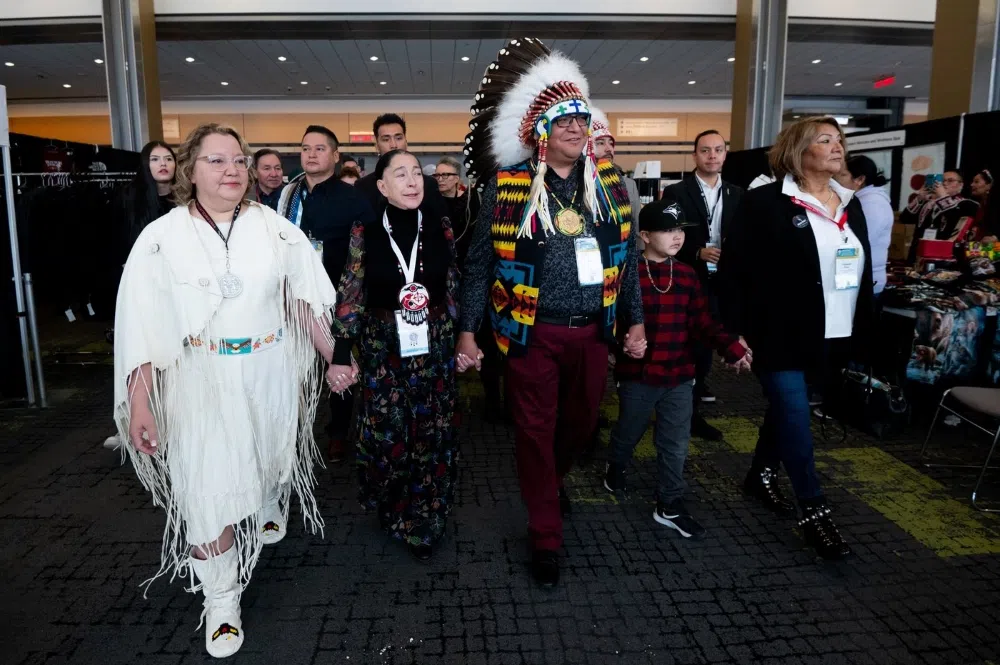Cindy Woodhouse became the new national chief of the Assembly of First Nations on Thursday, when she pleaded with Canadians to support the people she represents — and warned them to pay attention.
“You have to work with First Nations people in a good way,” said Woodhouse, who had been Manitoba regional chief for the AFN, which represents more than 600 First Nations across Canada.

“We are here in a good way,” she said in her acceptance speech, noting she had been raised by the teachings of her parents to work with all people. But, she added: “If you don’t listen to our people, you don’t listen to our chiefs, you don’t answer them, then there’s problems. And so, to Canada: we’re coming for you.”
Woodhouse became the next national chief Thursday morning after her closest challenger, David Pratt, conceded following six rounds of voting that stretched late into the previous night.
“I know that we have a lot of work to do,” said Woodhouse.
She also thanked former national chief RoseAnne Archibald, saying she “smashed glass ceilings for all of us.”
Archibald was ousted earlier this year over the findings of an investigation into complaints from five staff members about her conduct.
Joanna Bernard had been serving as interim chief.
After six rounds of balloting, Woodhouse had collected 50.8 per cent of the registered vote — short of the 60 per cent threshold needed for victory.
Pratt, vice-chief of the Federation of Sovereign Indigenous Nations, did not concede as expected after the fourth ballot, leading to a tense conversation with Woodhouse on the floor of the convention centre in downtown Ottawa and another round of voting.
He did not concede after the fifth or sixth, either, on the advice of his supporters who were holding out hope he could mount a comeback, and after another candidate, Sheila North, threw her support behind him in her concession speech.
But then Pratt conceded Thursday morning, before the vote at a special chiefs assembly in downtown Ottawa headed into a seventh round.
“We leave here united. We leave here behind our national chief. We’re back — and the future belongs to First Nations people,” Pratt told the gathering as he dropped out of the contest and cleared the way for Woodhouse.
“Her success is all of our success. So let’s lay aside the animosity.”
The third-party independent review of Archibald had concluded some of her behaviour amounted to harassment, and that she had breached confidentiality rules and violated internal policies by retaliating against complainants.
Archibald denied the allegations. Her supporters maintain she was removed from the post for trying to change the organization’s status quo.
Of the 231 chiefs who took part in the special assembly earlier this year, 71 per cent voted to remove her.
Six candidates were vying to be national chief, including Reginald Bellerose, chair of the Saskatchewan Indian Gaming Authority, longtime Batchewana First Nation Chief Dean Sayers and former Alberta regional chief Craig Makinaw.
On Wednesday evening, North, a former Manitoba grand chief and longtime advocate for missing and murdered Indigenous women, steered her support to Pratt before bowing out of the race.
She also launched a shot at Woodhouse, who was an executive when Archibald was voted out as national chief.
“She did not deserve that,” North said of Archibald. “It doesn’t mean I agree with everything she did or how she did it. But she should have been given that respect to finish her term.”
North, who ran unsuccessfully for the job in 2018, also said Wednesday she hoped the AFN would continue to push for better protections for Indigenous women and girls, and to confront gender-based violence.
“You can do it, chiefs,” she told delegates. “Our relatives are waiting for us to do better.”







